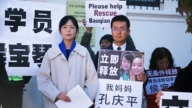【新唐人2011年3月15日讯】每年过年后,中国沿海总会出现“用工荒”、“招工难”的问题,中共“人力资源和社会保障部”部长尹蔚民表示:中国社会“招工难”的问题反映出就业环境存在着结构性矛盾。对此,上个月底《工人日报》对数百位农民工进行问卷调查及个人采访,深入探讨中国社会缺工问题的真实原因。
《工人日报》指出,按照经济学的常识,劳动力由供需巿场决定价格。中国经过30多年的发展,出现缺工现象意味着劳动力供给比需求小,农民工应可享受工资待遇的提升,以及保险、福利上的改善。遗憾的是,《工人日报》记者在对数百位农民工的个案采访及问卷分析后,始终得不到这样的答案。
报导说,近两年来农民工的工资虽有提高,求职时也获得了一定的选择权,但也只有如此,他们依然得不到其他关于劳动合同、社会保险,与劳动保护等基本保障。
报导还发现,不少企业之所以招工难,可能与不签劳动合同,工资不够吸引人,或员工觉的不受到关爱等有关。根据国家统计局的资料显示,近年来,农民工后备力量以每年600万人的速度递减,2008年以来总计减少了2000万人。也就是农民工愿意离乡背景,投入城镇就业巿场的人口确实越来越少了。
上个世纪60年代,日本政府在面对“用工荒”问题时,采取了“促进技术升级”和“调整产业结构”等方法,不但解决了缺工问题,也保障劳工的技术升级与福利。反观中国这三十多年来,廉价的劳动力为组装和加工导向的企业带来了一定的利润,但广大农民工却没能得到技术升级与基本的劳动保障。
这不禁让人联想到这个月12号(三月十二号)日本宫城发生大地震后,一位中国网友(新浪微网志,蓝乐)说:日本地震避难,街上的自动贩卖机、公共电话、便利商店免费,大型超市开放给民众避难,因为日本说发展经济是为了让国民幸福。但是在云南灾区领取帐篷的民众要先交押金,那一刻(中共)政府让所有凝聚力都变成了豆腐花。
网民感叹,不是日本太好,而是中共政府做得太差!或许这给为什么农民工宁愿回乡,也不愿留下来工作的缺工问题,提供了一个可能的答案。
新唐人记者曾耀贤、萧宇综合报导。
Media Probes China’s Workers Shortage
Every year, China’s coastal cities would run into
shortage of workers after New Year. Chinese Minister
of Human Resources and Social Security, Yin Weiming,
said, China’s employment environment has structural
problems. Last month, Worker’s Daily conducted
survey on several hundreds of migrant workers
in order to investigate the real reason
of China’s worker shortage.
Worker’s Daily said, it is a common sense that
the demand on manpower determines its price.
China’s shortage of workers means the demand
is larger than the supply, which should allow
migrant workers to have a better wage,
insurance and benefits. Unfortunately,
this is not so according to the survey
conducted by Worker’s Daily.
In the past 2 years, the wages of migrant workers
somewhat increased and the job options for them
were also wider, but they still did not have any basic
protections like employment contracts,
social security and workers’ compensation.
The report said, it is difficult to get more workers,
because there is no contract, appealing wages,
or care from the employers.
Data from National Bureau of Statistics shows,
the backup force of migrant workers
reduces at a rate of 6 million per year.
Since 2008, the total number is lessened by 20 million.
Fewer and fewer people are willing to leave
their home and come to the city for jobs.
In the 1960’s, facing shortage of workers,
the Japanese government promoted
technology advancement and adjusted
the industry structure. This solved
the problem of worker shortage and guaranteed
welfare and technological upgrades for workers.
In China, however, the vast migrant workers
didn’t get much benefit or master
updated technologies in the past three decades,
although the cheap labor did bring profit
to the assembly and processing oriented industry.
After the Japanese earthquake, a Chinese netizen
said, Japan’s vending machines, phone booths,
and convenient stores provide free service
for the victims. Supermarkets open for victims
to take shelter. All this is because
the economic development in Japan
is for the wellbeing of its people.
In China’s recent Yunnan earthquake, however,
victims need to give deposit before getting a tent.
At that moment, the Chinese government has lost
all its binding power if it had any.
Netizens said, it’s not that the Japanese government
is super good, but that the Chinese government
is just doing so poorly. It perhaps explains
why migrant workers would rather go back home
than seek jobs in the city.
NTD reporters Zeng Yaoxian and Xiao Yu































